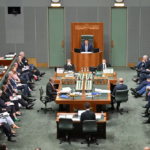Australia, we need to talk
Australians are kind and generous people, but like anyone, we are prone to fear what we do not know. Alycia Gawthorne from the community advocacy organisation GetUp says it is up to us to start changing the way we talk about asylum seekers.
The political pundits are calling it “Tony Abbott’s Tampa moment”, a reference to the infamous three-day stand-off between the Howard government and the government of Norway.
Right now there are 153 asylum seekers in limbo, in the middle of the ocean. The fate of these asylum seekers currently rests with the High Court, which will determine whether our government can send them back to Sri Lanka – the very place they were fleeing. But while the parallels between this latest event and the Tampa affair are stark, I fear the most striking similarity won’t be what’s happening now, but what happens after.
Depending on whom you ask, the Tampa affair is either remembered as one of Howard’s greatest failures or his greatest show of strength. But in its aftermath, the problems faced by those seeking asylum in Australia didn’t change – nor did Australians’ attitude towards them. In fact since then, things only grew worse. My worry is that once Mr Abbott’s “Tampa moment” is over, it will be the same old story.
Sadly, our government’s actions appear to reflect the attitudes many Australians have towards asylum seekers. They are continually labelled “queue jumpers” or “illegals” and held responsible for everything from hospital queues to traffic jams.
But this is not to say Australians are unkind people who lack compassion. Actually, I would argue quite the opposite. Australians are kind and generous people, but like anyone, we are prone to fear what we do not know. The success of our government’s asylum seeker policies hinges on this fear, which is only fuelled by irresponsible and sensationalist reporting, as seen on the front page of The Daily Telegraph recently.
What you rarely see splashed across the pages are stories like that of Dr Munjed Al Muderis, who spoke at GetUp’s Light the Dark vigil in Sydney earlier this year.
Dr Al Muderis fled Iraq in 1999, where he was ordered to amputate the ears from Iraqi soldiers who had deserted from Saddam Hussein’s brutal regime. When his hospital supervisor was murdered before his very eyes, he decided to make the brave journey to Australia on a rickety boat with 150 passengers. Inside the Curtin detention centre, Dr Al Muderis was known simply as “Number 982”. Today, he is known as one of the world’s leading orthopaedic surgeons and has been working as an air force reservist surgeon and hopes to work on the frontline to help Australian troops.
Nor do we hear stories like Riz Wakil’s, who came from Afghanistan in 1999 with 77 other people on a 30-foot fishing boat when he was just 18 years old. Mr Wakil now runs his own business in Fairfield, Sydney where he employs five other people.
It’s stories like these, which can easily go unheard amongst the much louder noise of those seeking to peddle untruths about the kind of people asylum seekers are. So it’s up to us to start telling the other side of the story and start changing the way we talk about asylum seekers.
We need to stop referring to asylum seekers as “queue jumpers” or “illegals” and recognise them for their incredible resilience and courage. Acknowledge them as people who have so much to contribute to our society, if we only gave them half a chance.
The path to a humane and compassionate approach will be long and hard, and no one invested in this fight is under any delusions that it will be easy. But by sharing refugees and asylum seekers’ stories, and encouraging them to tell their own – just maybe we can turn the current conversation on its head. So Australia, we need to talk.
Alycia Gawthorne is a campaigner with GetUp, focusing on the rights of refugees and asylum seekers.














Rob Eager
August 2, 2014 at 2:48 am
Thanks for the post Alycia.
Thanks for the post Alycia. I worked for IHMS for 3 years, being primarily responsible for reporting on the health of people in detention. This included statistical reports such as for the Senate Estimates and providing the Health Data Set to government (the one the government wanted to have figures withdrawn from), but also on reports about the health of individual asylum seekers. As a result, I'm probably a little more aware than the average citizen of how detrimental detention can be on the health of those incarcerated, but also, how quickly the detrimental effects can dissipate when put into an environment which is supportive and where they can experience freedom (Depression, Anxiety & Stress Score (DASS) levels normalise very quickly for those moved into community care).
You are correct in saying we need to start hearing the stories of individuals. This will help humanise the asylum seeker debate and we are starting to see this in the recent revelations at the Human Rights inquiry around the treatment of children. More needs to be done in this area. We seem to have the same fight over and over again. After finally getting kids out of detention under Howard, we're back at square one – with much the same results as then. We also however need to focus the discussion on the broader cost to Australia. The hard hearted may not be swayed by individual stories of torture, trauma and mental anguish, but the hard headed should be persuaded that the path we are on is not economically sound. This should be an easy fight to win! In this environment of "Budget Emergency" called out by Joe Hockey at every opportunity, cost for asylum seeker health care alone runs at around $1.2M…per MONTH. The problem is that, rather than decreasing with the recent detention centre closures and move to offshore processing, the costs are, if anything, rising. This is because it is more expensive to send a staff member to Manus Is or Nauru than it is to send one to Darwin. Further, on Manus Is each staff member is forced by the PNG Government to return to the Australian mainland every month and reapply for a visa at a cost of around $200 each. This cost is passed through to the government. In fact, government contracts for 3rd party providers, effectively allow all costs associated with carrying out the contract to be passed through. On Nauru, there is a "visa" fee of $1000 per asylum seeker per month that the government also pays. What I have touched on above, is a very small window into the economic cost of banging people away in detention centres indefinitely. You are right when you say "we need to talk".